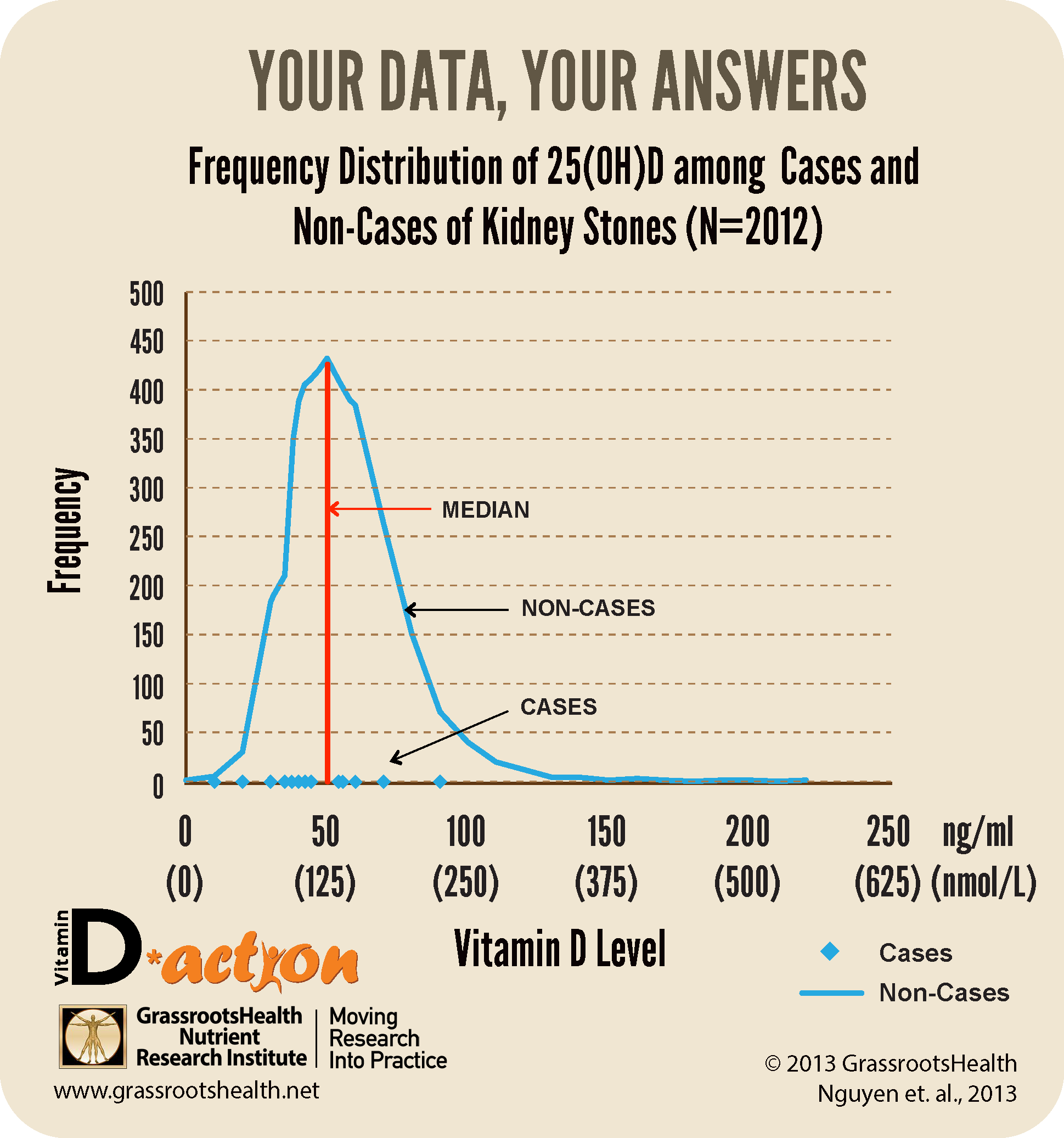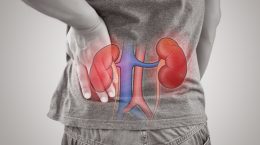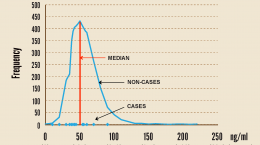Published on March 9, 2023
Key Points
- Some doctors think that because vitamin D helps the body to absorb calcium, higher intake of vitamin D can lead to kidney stones made of calcium. But there is something missing about this claim: evidence.
- One study by a research team from Creighton University, GrassrootsHealth, and the University of California, San Diego School of Medicine looked at 2,012 adults and found no association between vitamin D levels in the range of 20 to 100 ng/ml and the incidence of kidney stones; instead, age, weight, and gender were important factors for kidney stone formation
- Not only do high levels of vitamin D not cause kidney stones, two additional case-controlled studies have shown that people with low levels of vitamin D are more than twice as likely to develop a kidney stone
So far, in our vitamin D myth busting series, we have dispelled myths such as those claiming vitamin D can become toxic when stored in fat, that toxicity is a concern when taking more than the official RDA of 600 IU/day, and discussed the way vitamin D is involved in the intricate balance with other nutrients. Today’s myth – that taking vitamin D causes kidney stones – is based on the interplay of vitamin D with another nutrient, calcium. However, not only has the idea has been debunked with the findings of several research studies, but the opposite seems to be true!
*Please Note: Individuals with certain conditions, such as primary hyperparathyroidism, sarcoidosis, tuberculosis, and lymphoma, may be hypersensitive to vitamin D supplementation and may need to be more cautious when supplementing, or work with a health care provider. If you feel you have negative side effects from vitamin D supplementation, please talk to your doctor. These conditions will be discussed in more detail in an upcoming post.
How do you get kidney stones?
 Kidney stones are hard, crystallized deposits made of salts and minerals, such as calcium and phosphate, which form inside the kidneys. Often these stones must be passed out in the urine and can become stuck in the urinary tract which results in incredible pain. There are many known causes for these deposits, including drinking too little water and eating foods high in purines – a chemical compound that occurs naturally in your body but is also found in foods and drinks, such as beer and other yeasty beverages.
Kidney stones are hard, crystallized deposits made of salts and minerals, such as calcium and phosphate, which form inside the kidneys. Often these stones must be passed out in the urine and can become stuck in the urinary tract which results in incredible pain. There are many known causes for these deposits, including drinking too little water and eating foods high in purines – a chemical compound that occurs naturally in your body but is also found in foods and drinks, such as beer and other yeasty beverages.
Some doctors think that because vitamin D helps the body to absorb calcium, higher intake of vitamin D can lead to kidney stones made of calcium. But there is something missing about this claim: evidence. Simply put, results from dozens of well-designed studies provide no evidence that vitamin D contributes to kidney stone formation.
Research to the Rescue!
A 2013 study by a research team from Creighton University, GrassrootsHealth, and the University of California, San Diego School of Medicine looked at 2,012 adults and found no association between vitamin D levels in the range of 20 to 100 ng/ml and the incidence of kidney stones. Instead, age, weight, and gender were important factors for kidney stone formation.
A 2016 meta-analysis (a method for combining data from multiple studies) by New Zealand researchers included 19,833 participants and again found no connection between vitamin D supplementation dose or duration and kidney stones.
The largest study to look at vitamin D and the risk of kidney stones came out of Harvard Medical School. These scientists studied a whopping 45,616 individuals over a 14 year period. What did they find? You got it – no increased risk of kidney stones with vitamin D.
Not only do high levels of vitamin D not cause kidney stones, two more recent case-controlled studies have shown that people with low levels of vitamin D are more than twice as likely to develop a kidney stone!
In other words, higher vitamin D levels may protect you from a kidney stone. One was a study by Girón-Prieto et al. involving 366 patients. The other, by Ticinesi et al., found that overall, patients who developed kidney stones had lower vitamin D levels, and suggested that vitamin D deficiency be reconsidered as a potential cause. These new studies reveal that the old myth of vitamin D leading to kidney stones is unfounded.
If the fear of kidney stones is preventing you from taking vitamin D supplements, rest easy and take the supplements you may need to achieve a healthy vitamin D level.
Is it true?
Our goal with this “Vitamin D Myths” series is to provide information and resources to answer the question, “Why should I care about vitamin D?” and to help dispel the myths and misconceptions surrounding it that may be preventing you and others from accepting it as an essential component to health. We will also discuss other nutrients essential to the function of vitamin D (and vice versa) within the body that should not be ignored.
Vitamin D is necessary for multiple functions within the body and should not be ignored, but has the hype about vitamin D and its role in the body’s response to COVID-19 been over-exaggerated? What concerns about vitamin D are valid, and which are not? We want to provide you with evidence based information to help you decide what vitamin D action to take, if any, for your own health.
Know if you are getting enough vitamin D and other important nutrients
Vitamin D, along with magnesium, zinc, and omega-3s, are just a few nutrients vital to maintaining our health. To know if you are getting enough of these nutrients, make sure you test today!
Through GrassrootsHealth Nutrient Research Institute, you can also test your essential elements magnesium, copper, zinc and selenium, toxins such as lead, mercury and cadmium, as well as your omega-3 levels, inflammation levels and thyroid stimulating hormone (TSH) level. Find out your levels today! Log on to the test selection page (click the link below) to get your tests and see for yourself if your levels can be improved.
Make sure you track your results before and after, about every 6 months!
How can I track my nutrient intake and levels over time?
To help you track your supplement use and nutrient levels, GrassrootsHealth has created the Personal Health Nutrient Decision System called
For each specific supplement, you can track what days you take it, how much, and many other details. This will help you know your true supplemental intake and what patterns of use work for you to reach and maintain optimum nutrient levels. Check it out today!








